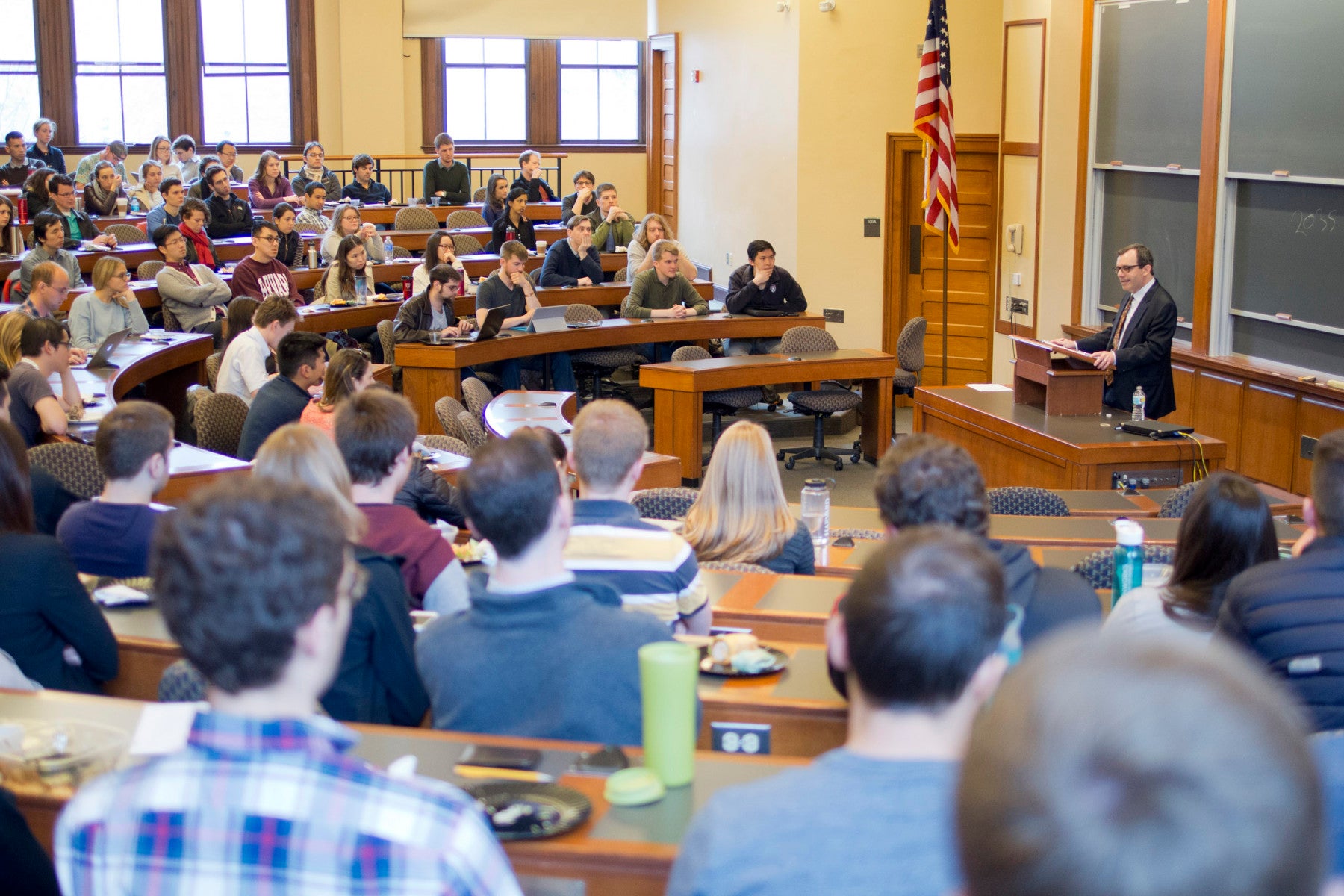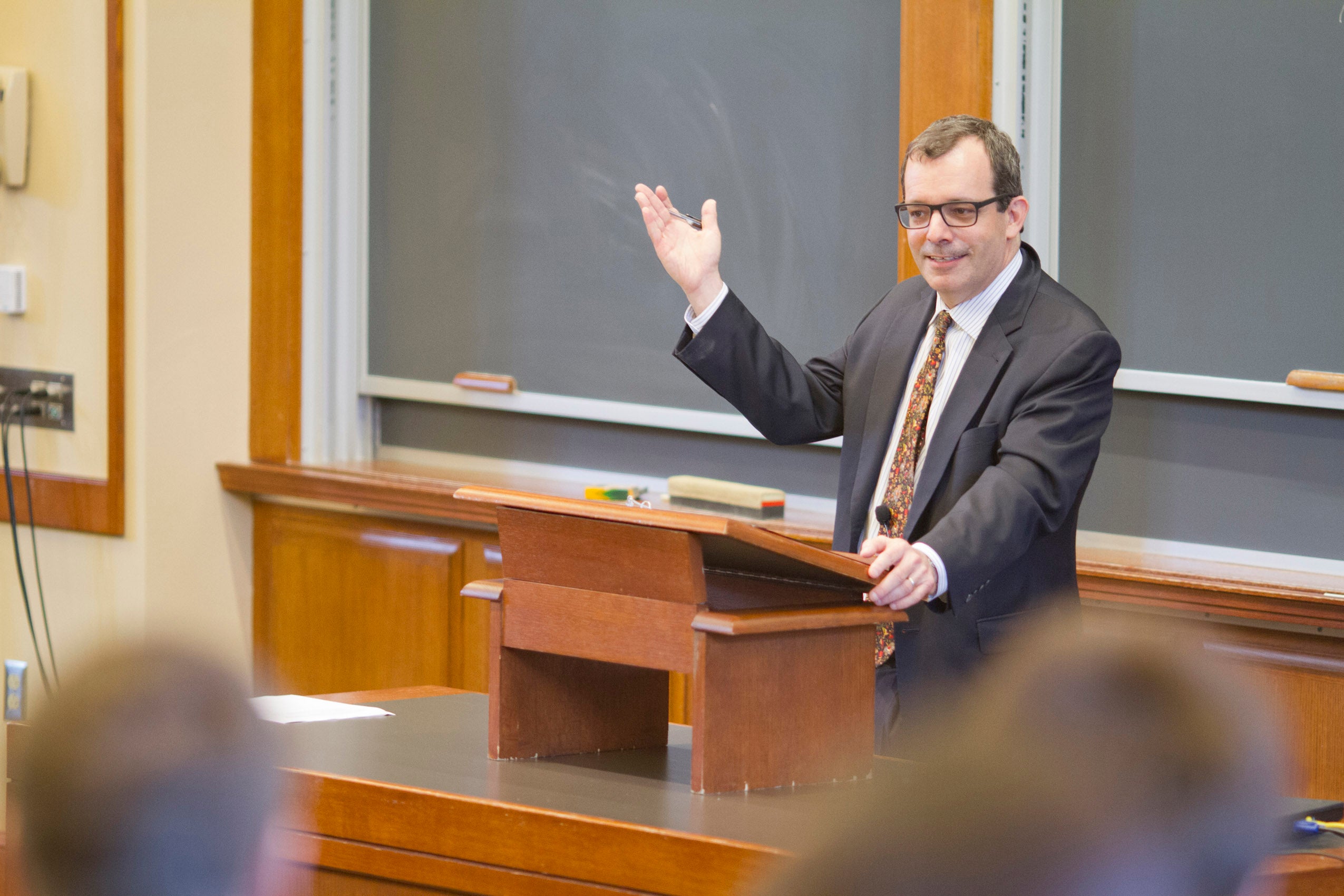On Thursday, April 23, Bruce Bromley Professor of Law John Manning ’85 capped off a four-part series of “Last Lectures” for the Harvard Law School Class of 2015 with a list of eight simple rules students should live by if they wish to be both “happy lawyers and human beings.” Organized by the Class Marshals, the series asked some of Harvard’s most popular professors to give a lecture as if it were the last one they would ever give – or, for those less morbid, the last lecture they would give to students about to graduate from law school. Prior to Manning, Professors John Coates, Gabriella Blum LL.M. ’01, SJD ’03, and Noah Feldman also gave talks.
Based on his 30 years of experience spanning 10 jobs across the public and private sectors, as well as academia, Manning recommended the following:
Rule #1: “Don’t think you’ve got it all figured out yet.” When Manning came to law school, he planned to become a corporate attorney. But after clerking on the D.C. Circuit, Manning, who now teaches Federal Courts, Constitutional Law, Legislation & Regulation, and Administrative Law at Harvard, discovered that he was instead drawn to broader questions about the integrity of the legal process. “Our profession is wide enough to accommodate many dreams, and provide many forms of fulfillment,” Manning said. “Be prepared to learn that you do not know for certain what will make you happy every day that you wake up as a lawyer.”
Rule #2: “Every time you have a choice of job, pick whatever next job sounds most interesting to you.” Manning decried a metaphor that was popular when he graduated from law school, that young professionals were allowed “one free move card,” but if they changed jobs more than once, their careers would be knocked off track and they would never recover. “Your career in the law is not a track,” Manning said. “A track gets you somewhere quicker, but it does so at the cost of reducing your range of motion, and the trade-off is not the way to lead your life.” Manning assured students that should they ever wish to get back on the track, it would still be there; but that in the meantime, going off-track would be the better way to discover the unexpected dreams he had spoken of earlier.
Rule #3: “Your tummy is your best advisor.” Students should do their research and arm themselves with the facts, Manning said, but ultimately, they would have to trust their guts, and know that if they make the wrong decision, they will be able to fix it later.
Rule #4: “You will make mistakes; so will others. So be forgiving in both cases.” Manning told students that he mangled his very first assignment as a clerk for Judge Robert Bork. Judge Bork simply asked him to fix the mistake. “He didn’t fire me, yell at me, give me the stink eye or make me feel bad for one second,” Manning said. “Nothing he could have done could have motivated me more to want to avoid making another mistake on that job.” Therefore, Manning said, students should forgive themselves, own their mistakes, and treat others who err with kindness.

Rule #5: “Empathize with your opponents.” At Harvard, Manning said, he frequently saw students from different ideological perspectives get along and treat each other with respect. Yet in political circles, the goodwill would vanish, as would opportunities to learn from those who think differently. “If you understand your opponents, truly understand the merits of their position, you will know better how to counter their arguments,” Manning said. “And sometimes you may find out that they were a little bit right and you were a little bit wrong. If you demonize your opponents, you cannot learn from them.”
Rule #6: “You will have disappointments. And you will survive them.” Manning noted that Supreme Court Justice Elena Kagan was passed over to be the dean at the University of Texas before she became Dean of Harvard Law, and that Justice Scalia had missed out on being the Solicitor General before he was appointed to the D.C. Circuit. Although Manning warned that not all disappointments would lead to seats on the Supreme Court, maintaining grace in defeat and not letting pride or anger guide one’s decisions would serve students better in the long run than stewing in disappointment. “Be prepared to reinvent yourself,” Manning said. “If some day you find yourself at the end of the line, unable to fulfill that nonnegotiable dream, there is only one thing to do – move on.”
Rule #7: “Be honorable.” Although choosing between what is right and what will benefit you in the short term may seem difficult, Manning said, those are actually the easiest decisions. Maintaining one’s integrity is the one nonnegotiable in life, Manning said, and so students should be wary of ever taking a job that they are not prepared to walk away from.
Finally, Rule #8: “Save room in your life for loved ones.” Manning admitted that he had missed dinner with his family to write the very lecture he was delivering, but reminded students that while many will find satisfaction in throwing themselves 100 percent into their careers – and that those people “get a lot done,” — others need time to be with loved ones, and there is value in either path.
***
